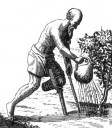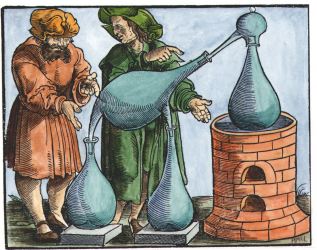| Author | Post |
|---|
Rafal T. Prinke
Member

| Joined: | Tue Mar 4th, 2008 |
| Location: | Poland |
| Posts: | 150 |
| Status: |
Offline
|
|
Posted: Fri Dec 9th, 2011 09:31 pm |
|
It is generally assumed that alchemy was brought to the Latin world in 1144 with the translation of Robert de Castris. But I noted here and there a reference to an alchemist in Hamburg as recorded by Adam of Bremen. I thought that may have been an overinterpretation but finally checked the source which says:
Adam Bremensis, Lib. III, Cap. XXXVI
[about Bishop Adalbert of Bremen, year 1063]
Schol. 77 (78). Inter quos advena Paulus ex Iudaismo conversus a ad christianam fidem quique, nescio pro avaritia vel pro sapientia exulatus in Greciam, cum inde remearet, nostro adhaesit pontifici, glorians se multarum artium callere ingenio, adeo ut ex insciis litterarum philosophos redderet per triennium et ex cupro formaret aurum obrizum. Facile persuasit ille archiepiscopo credere omnia quae dixit, adiciens hoc omnibus mendaciis suis, quod cito faceret apud Hammaburg monetam publicam ex auro fieri et pro denariis bizantios dari (B1. 2. C).
As far as I understand, the person was a Jew converted to Christianity who had been educated in Greece and produced gold from copper for the archbishop. Is that correct? I dare not ask Paul for a translation 
If that is trustworthy, it would mean that practical artisanal alchemy (or what Needham called "aurifictio") was flourishing in Greece in the 11th c.Last edited on Fri Dec 9th, 2011 09:33 pm by Rafal T. Prinke
|
Paul Ferguson
Member

| Joined: | Fri Feb 15th, 2008 |
| Location: | |
| Posts: | 1538 |
| Status: |
Offline
|
|
Posted: Fri Dec 9th, 2011 11:55 pm |
|
Rafal T. Prinke wrote:
It is generally assumed that alchemy was brought to the Latin world in 1144 with the translation of Robert de Castris. But I noted here and there a reference to an alchemist in Hamburg as recorded by Adam of Bremen. I thought that may have been an overinterpretation but finally checked the source which says:
Adam Bremensis, Lib. III, Cap. XXXVI
[about Bishop Adalbert of Bremen, year 1063]
Schol. 77 (78). Inter quos advena Paulus ex Iudaismo conversus a ad christianam fidem quique, nescio pro avaritia vel pro sapientia exulatus in Greciam, cum inde remearet, nostro adhaesit pontifici, glorians se multarum artium callere ingenio, adeo ut ex insciis litterarum philosophos redderet per triennium et ex cupro formaret aurum obrizum. Facile persuasit ille archiepiscopo credere omnia quae dixit, adiciens hoc omnibus mendaciis suis, quod cito faceret apud Hammaburg monetam publicam ex auro fieri et pro denariis bizantios dari (B1. 2. C).
As far as I understand, the person was a Jew converted to Christianity who had been educated in Greece and produced gold from copper for the archbishop. Is that correct? I dare not ask Paul for a translation 
If that is trustworthy, it would mean that practical artisanal alchemy (or what Needham called "aurifictio") was flourishing in Greece in the 11th c.
Well here's my effort:
"Among these people was a foreigner called Paul, a convert from Judaism to the Christian faith, who had been banished to Greece, though whether on account of his greed or because of his wisdom I know not. When he returned from Greece he became close to our pontiff, boasting to him that he was a past-master of many arts, to such an extent that he could turn the untutored into Philosophers in just three years, and could make fine gold from copper. Paul readily persuaded the Archbishop to believe everything that he said, adding to all his lies that, in Hamburg, he would soon be making public coinage, which would be produced from gold and be issued as Byzantine denarii."
Mentioned here:
http://books.google.com/books?id=Yf0PAQAAIAAJ&q=%22adalbert+of+bremen%22+alchemist&dq=%22adalbert+of+bremen%22+alchemist&hl=fr&ei=UaHiTsq2DYva8QO47vzkAw&sa=X&oi=book_result&ct=result&resnum=4&ved=0CEAQ6AEwAw
http://books.google.com/books?id=dh9M-FiskWQC&pg=PA773&dq=%22adalbert+of+bremen%22+alchemist&hl=fr&ei=UaHiTsq2DYva8QO47vzkAw&sa=X&oi=book_result&ct=result&resnum=2&ved=0CDUQ6AEwAQ#v=onepage&q=%22adalbert%20of%20bremen%22%20alchemist&f=false
http://books.google.com/books?id=z34PAAAAIAAJ&pg=PA594&dq=%22adalbert+of+bremen%22+alchemist&hl=fr&ei=UaHiTsq2DYva8QO47vzkAw&sa=X&oi=book_result&ct=result&resnum=1&ved=0CC8Q6AEwAA#v=onepage&q=%22adalbert%20of%20bremen%22%20alchemist&f=false
Judging by the above references he seems to have been regarded as a con-man rather than an alchemist which may explain his neglect by historians of alchemy.Last edited on Sat Dec 10th, 2011 12:23 am by Paul Ferguson
|
Rafal T. Prinke
Member

| Joined: | Tue Mar 4th, 2008 |
| Location: | Poland |
| Posts: | 150 |
| Status: |
Offline
|
|
Posted: Sat Dec 10th, 2011 05:09 pm |
|
| Thank you so much, Paul! Indeed, it seems that he was just producing an alloy of copper without any alchemical theory behind it. But we cannot be sure. What is intriguing, he intended to issue "Byzantine denarii" -- while Islamic sources suggest that it was generally believed among the Arabs that the Emperor himself knew the secret of converting copper into gold (the same!). See: Nadia Maria El-Cheikh, Byzantium viewed by the Arabs, Cambridge, MA 2004, p. 157. In the context of Adam's Scholium saying that Paul had been in Greece, it looks quite interesting.
|
Alexander Guthrie Stewart
Member
| Joined: | Sat Feb 16th, 2008 |
| Location: | |
| Posts: | 192 |
| Status: |
Offline
|
|
Posted: Tue Dec 20th, 2011 06:19 pm |
|
Ah ha!
I did exactly the same search earlier this year when chasing up sources from Maxwell-Stuart's book "The alchemical Choir".
“The first mention of alchemy in a Western source (C. 1050) reported a fraudulent transmutation into gold by a Byzantine Jew called ‘Paul’
He in turn got it from Peter Marshall's book "The Philosopher's Stone", who said it was a Byzantine Jew. My Latin is poor but I worked out that it said an ex-jew. Thus the perils of relying upon secondary works rather than checking things yourself.
|

Current time is 09:40 am | |
|
|
|

